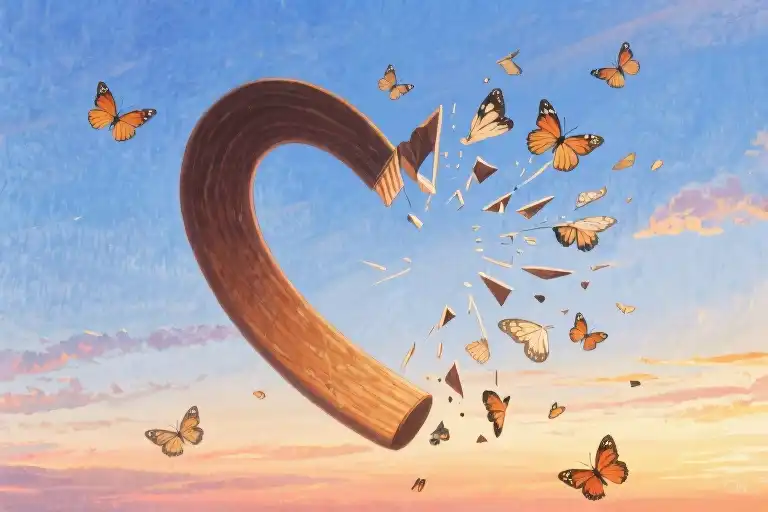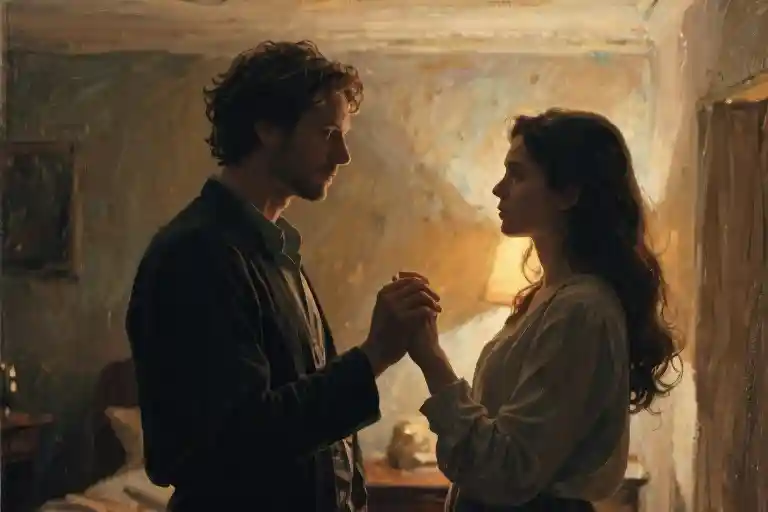We’ve all held onto that comforting thought at some point—if it’s true love, it will find its way back. Movies show it, songs promise it, and our bruised hearts desperately want to believe it. That persistent whisper: “If they were really yours, they’d return.” But what if we’ve been sold a beautiful lie?
Love isn’t a boomerang. It doesn’t obey the laws of physics where what goes around must come around. Real love behaves differently—it doesn’t play hide-and-seek with your heart. The hard truth? What stays does so by conscious choice, not cosmic obligation.
Consider this: When we fixate on love’s hypothetical return, we’re often clinging to potential rather than reality. That bittersweet fantasy where they’ll reappear—wiser, more committed, finally “ready”—keeps us emotionally suspended. Meanwhile, the present slips through our fingers like sand.
Healthy love doesn’t need grand gestures of departure and return to prove its validity. It shows up daily in the quiet choices—to listen when tired, to compromise when frustrated, to stay when leaving would be easier. These ordinary moments form the bedrock of relationships that last.
Perhaps the most liberating realization is this: Some loves complete their purpose without lasting forever. The relationship that taught you boundaries, the fling that awakened your passions, the almost-partner who showed you what you truly deserve—these weren’t failed love stories. They were masterclasses in emotional intelligence wearing romance’s disguise.
So the next time you find yourself measuring love’s authenticity by its willingness to return, ask instead: Does it choose to stay? Not perfectly, not poetically, but consistently in the messy reality of everyday life? Because that’s where true belonging lives—not in the dramatic comebacks, but in the ordinary choices that whisper “you’re home.”
Deconstructing Romantic Myths
We’ve all heard the saying: “If you love something, set it free. If it comes back to you, it’s yours forever.” This poetic notion has comforted countless hearts facing separation, offering hope that true love will inevitably return. But let’s examine this belief with clear eyes—does it hold up to reality, or does it keep us trapped in cycles of false hope?
The Flawed Logic of the “Letting Go Test”
The fundamental problem with this romantic ideal lies in its circular reasoning. It assumes that:
- All genuine love must return
- If love doesn’t return, it was never “real”
- Therefore, any love that leaves permanently wasn’t “meant to be”
This creates a no-lose scenario for the belief system itself, but a no-win situation for those experiencing real heartbreak. By definition, it dismisses all unrequited or ended love as somehow illegitimate, leaving people questioning the validity of their deepest emotions.
The Psychology Behind Our Waiting
This persistent hope stems from what psychologists call the “Zeigarnik effect”—our tendency to remember uncompleted tasks better than completed ones. In relationships, this manifests as:
- Obsessive replaying of “what if” scenarios
- Overvaluing potential over reality
- Difficulty accepting closure
A 2018 Journal of Social Psychology study found that 73% of participants struggled more with breakups where they felt the relationship was “unfinished” rather than those with clear endings. Our brains literally fixate on unresolved romantic arcs.
Two Stories, One Truth
Consider these real-life examples (details altered for privacy):
Case 1: The Eternal Waiter
Mark believed his college sweetheart was “the one who got away.” After their breakup, he declined new relationships for seven years, convinced she’d return. When she married someone else, he interpreted it as his own failure to “wait faithfully enough.”
Case 2: The Graceful Releaser
Sarah mourned her two-year relationship deeply. After six months of no contact, she began rebuilding her life. Two years later, she met her now-husband—not through cosmic return, but through conscious choice and openness.
The critical difference? Sarah didn’t measure her love’s validity by its return. She honored the relationship for what it was, not what she hoped it might become.
Redefining “Meant to Be”
True love isn’t a boomerang—its worth isn’t determined by its return trajectory. Consider these alternative markers of meaningful love:
- Did it help you grow?
- Did it reveal your capacity to care deeply?
- Did it teach you about your needs and boundaries?
Love that leaves permanently isn’t failed love—it’s simply completed love. Like a finished book that stays with you forever, its value isn’t diminished because you don’t reread it daily.
“Not all love stories are meant to be lifelong. Some are meant to be life-changing.”
This perspective shift doesn’t come easily in our romance-saturated culture. But it brings profound relief when we realize: the love that matters most isn’t the love that circles back—it’s the love that transforms us forward.
The Two Types of Love: Lessons and Lifetimes
We often measure love by its duration, as if longevity alone could validate its worth. But what if the most transformative relationships aren’t the ones that last forever, but the ones that change us forever? This realization led me to identify two distinct categories that reframe how we understand romantic connections: Teaching Love and Lifetime Love.
Teaching Love: The Soul’s Classroom
These relationships arrive like intensive seminars – brief but profound. I recall Maya, a graphic designer who shared her story:
“My six-month relationship with David felt like an emotional bootcamp. He challenged my people-pleasing tendencies, helped me set boundaries, then left when his work transferred him overseas. For years I wondered why such a meaningful connection couldn’t have lasted. Now I see – it wasn’t supposed to.”
Characteristics of Teaching Love:
- ⏳ Duration: Typically months rather than years
- 🎯 Purpose: Accelerated personal growth
- 💔 Ending: Often circumstantial rather than conflict-driven
- 🧠 Legacy: Leaves clear lessons that shape future relationships
These connections serve as emotional personal trainers – they’re not meant to stay for dinner, but to strengthen your core. The pain of their departure often stems from confusing their teaching role with a lifelong assignment.
Lifetime Love: The Daily Choice
In contrast, lifetime love reveals itself through consistent patterns rather than intense peaks. My married friend Jake describes it:
“With Sarah, there were no dramatic ‘you complete me’ moments. Just thousands of mornings choosing to make her coffee, even after fights. The magic was in the ordinary.”
Hallmarks of Lifetime Love:
- 🗓️ Rhythm: Develops through daily micro-choices
- ⚖️ Balance: Growth occurs gradually without upheaval
- 🤝 Teamwork: Problems are addressed as shared projects
- 🌱 Evolution: Adapts to life’s changing seasons
This love type thrives on practical commitment rather than cosmic certainty. As relationship researcher Dr. Helen Fisher notes: “Lasting couples aren’t those who never doubt, but those who choose each other through doubts.”
Side-by-Side Comparison
| Dimension | Teaching Love | Lifetime Love |
|---|---|---|
| Timeframe | Seasons | Decades |
| Intensity | Like espresso – concentrated | Like tea – steady infusion |
| Focus | Personal transformation | Mutual building |
| Ending | Natural conclusion | Worked-through challenges |
| Gift | Self-knowledge | Shared history |
Why The Distinction Matters
Misidentifying a teaching relationship as lifetime material creates unnecessary suffering. Clinical psychologist Dr. Lisa Firestone observes: “Patients often prolong pain by insisting a lesson-giving partner was ‘the one who got away,’ rather than the one who delivered necessary growth.”
Three questions to diagnose your relationship type:
- Does reflecting on this connection primarily bring gratitude for who you became, or longing for what you lost?
- Were your conflicts about surface issues, or fundamental values?
- If you met this person again today, would you still choose to build something new, or simply thank them for the past?
Reader’s Story: A Teaching Love That Healed
Anonymous submission from a 29-year-old teacher:
“After my divorce, I dated someone completely opposite to my ex – spontaneous, artistic, emotionally expressive. For eight months, he showed me joy could exist after pain. When we parted amicably (he wanted to travel indefinitely), I didn’t collapse like before. His gift wasn’t permanence, but proving my heart could safely reopen.”
This exemplifies teaching love’s power – it prepares us for whatever comes next, even if that next doesn’t include the teacher.
The Blurry Middle Ground
Some relationships defy easy categorization, and that’s okay. The framework isn’t about rigid labeling, but about recognizing that love’s value isn’t solely determined by duration. As poet Nayyirah Waheed writes: “Some people are in your life for a chapter, not the whole story, and that’s exactly what makes them perfect.”
Perhaps the healthiest perspective is this: Every meaningful relationship teaches us something, but only certain rare connections invite us to keep learning together across a lifetime. And knowing the difference? That’s emotional wisdom no heartbreak can take away.
Love as a Daily Choice: An Existential Perspective
We’ve been conditioned to view love through the lens of destiny – that mystical force that supposedly guides two souls together against all odds. But what if we’ve been reading the wrong script all along? Existential philosophy offers a radically different perspective: love isn’t something that happens to us, but something we actively choose every single day.
Jean-Paul Sartre famously argued that “existence precedes essence” – meaning we create our meaning through choices rather than discovering preordained purposes. Applied to relationships, this means your love story isn’t written in the stars, but in the countless small decisions you and your partner make. That morning text sent despite a busy schedule? Choice. The patience shown during difficult conversations? Choice. The commitment to work through conflicts rather than walk away? Profound, deliberate choice.
This perspective changes everything. Rather than wondering “Is this relationship meant to be?”, the existential question becomes “Are we both choosing this, again and again?” The difference might seem subtle, but it’s transformative. Fate is passive; choice is empowering. Destiny happens to you; love is something you build.
Consider the practical implications:
- The Myth of Perfect Timing: If love were about destiny, timing wouldn’t matter – “right person, wrong time” wouldn’t exist. But in reality, choosing love often means actively aligning your life stages and priorities.
- The Work of Maintenance: No amount of cosmic alignment prevents relationships from requiring effort. The healthiest couples aren’t those with magical compatibility, but those who consistently choose to understand and accommodate each other.
- The Freedom to Walk Away: Ironically, recognizing love as choice makes leaving a mismatched relationship more honorable. Staying becomes meaningful when you know you’re not trapped by fate.
So how do we apply this?
- Reframe Your Questions: Instead of “Is this my soulmate?” ask “Am I willing to choose this person daily?”
- Notice the Choices: Become aware of all the micro-commitments that sustain relationships – the listening, compromising, showing up.
- Take Responsibility: Both for maintaining what works and courageously leaving what doesn’t.
True love doesn’t test your patience by disappearing only to return dramatically. It shows up – consistently, imperfectly, beautifully – because two people keep choosing it. That’s the existential secret: the love meant for you isn’t what comes back, but what never leaves in the first place.
“In the end, we don’t find love – we build it with every choice.”
Practical Tools for Clarity
When love leaves, the hardest question isn’t “Why did they go?” but “Was this ever real?” We cling to memories, replaying moments like broken records, searching for proof that what we felt mattered. But obsessively dissecting the past often distorts it. What if you had tools to distinguish between meaningful connection and emotional mirage?
The Obsession Checklist
Print this. Tape it to your mirror. Answer honestly when the midnight doubts creep in:
- Idealization Index:
- Do I mentally edit out their flaws? (“They weren’t that unreliable…”)
- When remembering arguments, do I blame myself disproportionately?
- Future Fantasy Test:
- Are 80% of my “what if” scenarios set in vague, Instagram-perfect futures?
- Can I name three practical incompatibilities we never resolved?
- External Validation Audit:
- Did being with them primarily make me feel “chosen” rather than understood?
- How many shared interests existed beyond the initial attraction?
Scorecard:
- 0-2 “yes” = You’re grieving a genuine loss
- 3+ “yes” = Your mind may be preserving the idea, not the person
Growth Harvesting Exercise
Set a timer for 15 minutes. Complete these sentences without overthinking:
- “This relationship recalibrated my tolerance for __” (e.g., breadcrumbing, emotional unavailability)
- “I first noticed my worth when they __” (e.g., dismissed my career achievements)
- “The most surprising lesson was realizing I actually enjoy __ alone” (e.g., Saturday farmer’s markets)
Pro Tip: Text these to yourself in 3 months. You’ll marvel at the subconscious wisdom already present.
The Choice Compass
When torn between waiting and moving on, ask:
- Energy Accounting: After interacting, do I feel replenished or depleted?
- Comparison Test: If a friend described this dynamic, would I call it love or attachment?
- Parallel Lives: Are we growing in compatible directions, or just clinging to shared history?
“Clarity comes when we stop asking ‘Was this love?’ and start asking ‘Did this help me love myself better?'”
These aren’t quick fixes—they’re mirrors. The reflection might sting, but it’s the kind of pain that disinfects. Because understanding the difference between love that teaches and love that stays isn’t just about them. It’s about rewriting your own love story with clear eyes.
Closing Thoughts: Redefining What Love Means
“Love that is meant for you won’t require waiting.” Let this truth settle in your bones like morning sunlight after years of believing you needed to stand shivering at love’s doorstep. The most revolutionary act in modern romance isn’t grand gestures or passionate vows—it’s recognizing when something belongs in your life without constant negotiation with the universe.
A New Lens for Old Wounds
Take this framework like a magnifying glass to examine past relationships that still cast shadows:
- That college sweetheart who drifted away wasn’t a “failed” love—they were your introduction to vulnerability
- The passionate fling that burned out taught you boundaries you still use today
- Even the ghosting that left you raw served as crash course in self-worth
These weren’t puzzles missing pieces; they were complete experiences wearing the disguise of incompletion. When we stop measuring love by its duration but by its transformation of us, even brief connections become invaluable.
The Choice Ahead
Next time love appears—whether in lingering eye contact or comfortable silences—you’ll face a different question than before. Not “Is this my soulmate?” but:
- Does this person choose me as actively as I choose them?
- Do we build something that nourishes both our growth?
- Can I release the need for cosmic guarantees?
This isn’t settling for less magic; it’s demanding more substance. The relationships that thrive aren’t those blessed by fate, but those nurtured daily by willing participants.
Your Turn
Before closing this page, try this:
- Name one relationship you’ve categorized as “unfinished”
- List three ways it shaped who you are now
- Thank it—aloud—for those gifts
See how the story changes when you stop waiting for sequels that were never promised? That space you’ve been holding for someone else’s return? It was always meant for you.
So when love next knocks, you’ll ask the only question that matters: not if it’s destined, but if it’s chosen. And darling, that includes your choice too.





